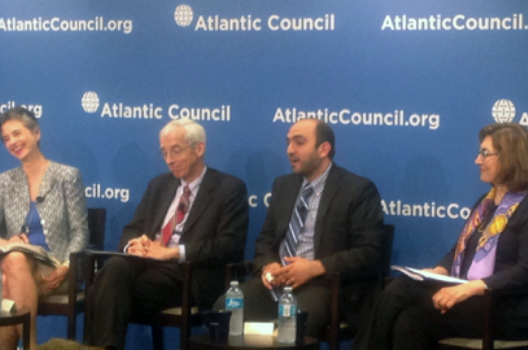 A new poll of Iranian public opinion shows rising support for the Joint Comprehensive Plan of Action (JCPOA) coupled with a willingness by Iranians to support restarting suspended aspects of the country’s nuclear program if the United States walks away from the JCPOA.
A new poll of Iranian public opinion shows rising support for the Joint Comprehensive Plan of Action (JCPOA) coupled with a willingness by Iranians to support restarting suspended aspects of the country’s nuclear program if the United States walks away from the JCPOA.
These findings were among those revealed on July 28, 2017, when the South Asia Center’s Future of Iran Initiative hosted a discussion of the ramifications of Hassan Rouhani’s re-election as Iranian president.
Ebrahim Mohseni, a research scholar at the Center for International and Security Studies at Maryland, spoke extensively about the new report, which reflected data collected by telephone in May and June 2017 and followed on two years of prior polls.
Mohseni remarked that public enthusiasm for the nuclear agreement had been slipping prior to the election, as promised economic benefits had failed to materialize. Yet there remained a consensus among Iranian presidential candidates in support of the deal and no candidate advocated renouncing the agreement. A poll taken after the May elections showed that 67.1 percent of Iranians approve of the JCPOA compared with 55.4 percent in December, 2016, shortly after the election of Donald Trump as US president.
At the same time, a large majority of Iranians continues to believe that the Trump administration will walk away from the agreement. In that event, 55.4 percent of Iranians would approve of their government restarting aspects of the nuclear program that were curbed by the JCPOA. That’s an increase from 48.4 percent before Trump’s election.
Nadereh Chamlou, a former senior adviser at the World Bank, said that although the Rouhani government may have oversold expectations for economic benefits from the nuclear agreement, “to some extent they have been met.” She noted that Iran’s economy had expanded by 6.8 percent last year, enough to “move the needle” of the global economy by contributing 0.1 percent to the world’s collective growth of 1.9 percent. Chamlou also said that while Iranians imported fewer goods last year, the unit value of imports remained relatively the same, suggesting that Iranians are buying higher end products from European markets. The United States, which maintains a number of sanctions on Iran, is missing out on over “$1 trillion … from engagement with Iran in the next decade,” she said.
Barbara Slavin, director of the Future of Iran Initiative at the Atlantic Council and the moderator of the discussion, said there are increasing indications that President Trump will not provide the necessary recertification of Iranian compliance with the JCPOA when the next deadline comes in October.
Paul Pillar, a senior fellow at the Center for Security Studies at Georgetown University and former national intelligence officer for the Near East and South Asia, said there are two basic directions Iran could follow in the event of a US withdrawal. The first option would be to “keep the deal alive with the participation of the other five countries with which they negotiated the deal.” The second option would be to leave the deal and resume nuclear activities that had been limited by the JCPOA.
Paul said there is greater likelihood that the first option will be chosen, given the strong support for the JCPOA by European countries, Russia and China. He compared this with Europeans’ recommitment to the Paris Agreement after US withdrawal from that global climate accord.
Image: Barbara Slavin, Paul Pillar, Ebrahim Mohseni and Nadereh Chamlou discuss "The Ramifications of Rouhani's Reelection
